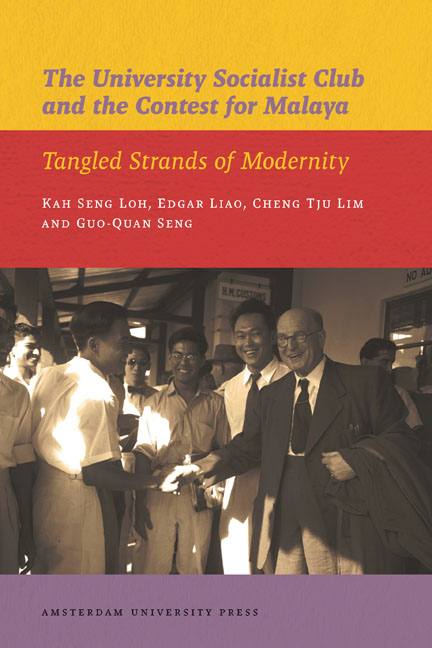Book contents
- Frontmatter
- Dedication
- Contents
- Acknowledgments
- List of Photographs
- Abbreviations
- 1 The Socialist Club and the Modernity Project
- 2 Awake in the Bowl of Night
- 3 The Fajar Trial
- 4 Visionary of the Nation, Voice of Stifled Malayans
- 5 A Beacon of Light on the Campus and Beyond
- 6 Frankly Partisan in the Struggle for Student Leadership
- 7 The Shadow over the Club
- 8 Resisting Malaysia, Swansong for Malaya
- 9 Long Night after Coldstore
- 10 In Defence of University Autonomy and Student Rights
- 11 Entwined Memories and Myths
- Conclusion: Modernity in Singapore and Malaya Reconsidered
- The University Socialists: Biographical Sketches
- Timeline of Events
- Notes
- Bibliography
- Index
- Publications Series
8 - Resisting Malaysia, Swansong for Malaya
Published online by Cambridge University Press: 21 January 2021
- Frontmatter
- Dedication
- Contents
- Acknowledgments
- List of Photographs
- Abbreviations
- 1 The Socialist Club and the Modernity Project
- 2 Awake in the Bowl of Night
- 3 The Fajar Trial
- 4 Visionary of the Nation, Voice of Stifled Malayans
- 5 A Beacon of Light on the Campus and Beyond
- 6 Frankly Partisan in the Struggle for Student Leadership
- 7 The Shadow over the Club
- 8 Resisting Malaysia, Swansong for Malaya
- 9 Long Night after Coldstore
- 10 In Defence of University Autonomy and Student Rights
- 11 Entwined Memories and Myths
- Conclusion: Modernity in Singapore and Malaya Reconsidered
- The University Socialists: Biographical Sketches
- Timeline of Events
- Notes
- Bibliography
- Index
- Publications Series
Summary
The University Socialists’ campaign to resist the formation of “Malaysia” between 1961 and 1963 was at once the culmination and final act of the Socialist Club's political activism on the national stage. From its inception, the vision of a socialist Malaya that included Singapore had provided the Club its chief existential identity, and guided the Club's activism on campus and beyond. However, the drastic turn of events in 1961 posed such a threat to the Club's fundamental values that it propelled the University Socialists to intervene more directly and robustly in the political process than in previous years. The sudden and almost reckless raising of stakes by the proponents and advocates of the “Malaysia” scheme both determined the Club's radical turn and necessitated its political neutering once the bets were down. On the surface, “Malaysia” provided the sort of political structure for the merger of Singapore and Malaya that the Club had fought for. But the Club, along with the entire left-wing movement in Singapore, was to oppose the plan as the antithesis of its Malayan vision.
At the national level, the tussle over the shared future of Singapore and Malaya constituted one half of a new political engineering phase of the Malayan Spring experiment, the other half being the changing role of the university and students, discussed in Chapter 10. With the PAP in power in 1959, the coalition of the Lee Kuan Yew group with the leftwing trade unions formed earlier in the decade began to unravel, precipitating a period of political crisis as new relationships began to crystallise. The British colonial regime now undertook to ensure the new government's position against its socialist critics by brokering an agreement on the merger between the PAP and the Alliance party. The British-Tunku-Lee tripartite and its opponents – the left-wing forces that later coalesced around the Barisan Sosialis – evoked their own rationalist visions of the merger, revealing a confidence that the combination of two very different states was possible whatever their prevailing political, socio-economic and cultural circumstances might be.
In May 1961, the Federation Prime Minister Tunku Abdul Rahman spoke of closer cooperation between former and current British colonies in Southeast Asia, namely, the Federation, Singapore, Sarawak, Brunei and North Borneo. This was the genesis of subsequent political moves to amalgamate these five territories into a super-state named “Malaysia”.
- Type
- Chapter
- Information
- The University Socialist Club and the Contest for MalayaTangled Strands of Modernity, pp. 167 - 190Publisher: Amsterdam University PressPrint publication year: 2012



